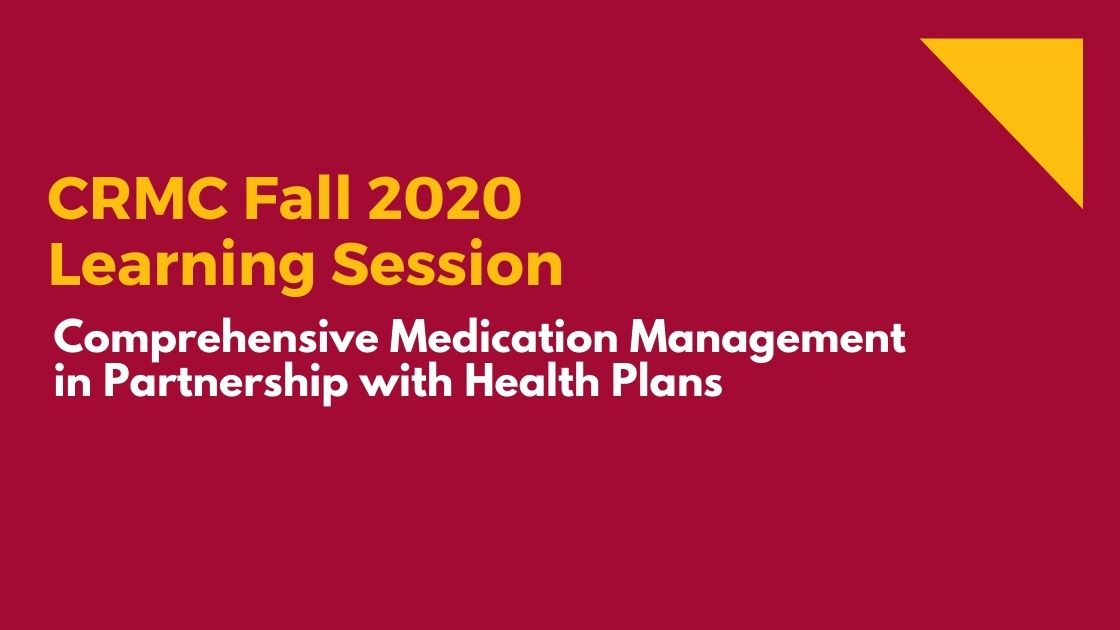
CRMC Fall 2020 Learning Session
Download agenda
Download learning session handout
Register by Friday, September 25th
Register here
The California Right Meds Collaborative (CRMC), in partnership with Los Angeles County Department of Public Health, CDC, L.A. Care Health Plan and Inland Empire Health Plan, is curating a network of pharmacies to deliver Comprehensive Medication Management (CMM) services to address the high burden of chronic diseases in local communities.
Target Audience
Pharmacists and leaders of health plans and government healthcare organizations interested in joining CRMC to implement or advance CMM services for high-risk patients in alignment with population health priorities.
Goals
Advance strategies and infrastructure for sustainable CMM services designed to improve health outcomes while lowering total cost of care for patients with uncontrolled chronic diseases.
Objectives
At the completion of the learning session, participants will be able to:
- Explain how leadership is a self-accountability
- Utilize bold aims to generate and evolve systems and results
- Cultivate a powerful shared mindset through leadership speech acts
- List current priorities and challenges of CDPH administration
- Summarize CDPH strategic plans and priorities that align with the work of CRMC
- Describe the current state of detection and control of risk factors associated with cardiovascular disease in Los Angeles County
- List LA County resources and programs to support better results for patients with hypertension, diabetes, and other common chronic diseases.
- Select relevant resources within the CRMC Implementation Handbook for initiating, improving, or advancing a CMM practice
- Identify current and evolving challenges and priorities related to chronic disease control, including impact of COVID-19
- Describe general direction and strategy moving forward, and alignment with CRMC (Why should other health plans join?)
- Describe the transition and challenges in initiating or advancing CMM services
- Explain the value of working with all CRMC stakeholders (fellow pilot pharmacists, health plans, schools of pharmacy) to advance CMM services
- Develop workflow to accommodate CMM service delivery
- Refine workflow through rapid iterative change cycles, e.g., PDSA
- Explain key differences between a Collaborative Practice Agreement and protocol
- Construct a collaborative practice agreement, protocol, etc., in accordance with legal and regulatory requirements that aligns with the risk tolerance of partnering organizations
- Formulate a personal branding strategy that promotes the benefits and quality of clinical services offered (increase patient trust/confidence, promote legitimacy of services, physicians testimonials, host map of participating pharmacies on CRMC website, have participating pharmacies listed with photos of CMM pharmacists on CRMC websites, etc.)
- List challenges unique to homeless patients in the course of providing CMM
- Develop solutions to overcome medication treatment success barriers for homeless patients
- Apply strategies for acquiring medications for patients who have very limited disposable income
- Compare different approaches to engaging homeless patients as a healthcare provider
- List critical variables and barriers to consider in order to successfully improve health outcomes for homeless patients
- Select an appropriate frequency of follow-up based on individual patient / clinical needs
- Leverage other individuals or strategies to provide effective follow-up care and monitoring
- Establish a system for patients to contact pharmacist providers regarding home self-management / monitoring results
- Provide culturally sensitive care to diverse patient populations
- Recognize and overcome personal cultural biases
- Incorporate proven techniques for patient engagement
Speakers
- Steven Chen, PharmD, FASHP, FNAP, Associate Dean for Clinical Affairs, USC School of Pharmacy
- Dennis Wagner, MPA, Former Director, iQuality Improvement & Innovation Group, Center for Medicare & Medicaid Services. Former Director, Office of Health Information Technology and Quality, Health Resources & Services Administration (HRSA.gov)
- Jessica Nunez de Ybarra, MD, MPH, FACPM, Public Health Medical Administrator, Chronic Disease Control Branch Chief, California Department of Public Health
- Tony Kuo, M.D., M.S.H.S., Director, Division of Chronic Disease and Injury Prevention, Los Angeles County Department of Public Health/ Co-Program Leader, Population Health Program, UCLA Clinical and Translational Science Institute
- Connie Kang, PharmD, Assistant Professor of Clinical Pharmacy, USC School of Pharmacy
- Alex Kang, PharmD, APh, BCPS, BCACP, BCGP, Director, Clinical Pharmacy, L.A. Care Health Plan
- Edward Jai, PharmD, Senior Director, Pharmaceutical Services, Inland Empire Health Plan
- Annie Thai, PharmD, 986 Pharmacy
- Janice Cooper, PharmD, CDE, Manchester/ Hawthorne Professional Pharmacy
- Christal Pham, PharmD, Assistant Director of Clinical Pharmacy, Western University of Health Sciences
- Michelle Chu, PharmD, BCACP, APh, Assistant Professor of Clinical Pharmacy, USC School of Pharmacy
- Paul Gregerson, MD, Chief Medical Officer, Internal Medicine Specialist, John Wesley Community Health Institute/ Coordinator, National Health Care for the Homeless Council
- Nader Tossoun, PharmD, Knollwood Pharmacy
- Jessica Abraham, PharmD, APh, Director of Population Health, USC School of Pharmacy
- Bianca Lee, PharmD, USC School of Pharmacy
